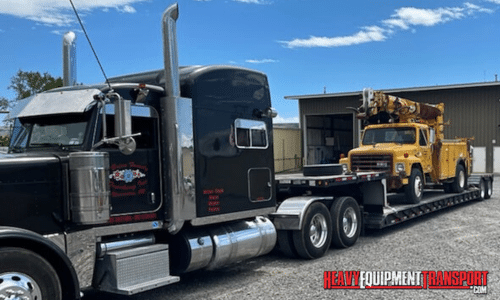A Comprehensive Guide to Heavy Duty Truck Transport

William Thomas / January 2021
In sectors like construction and logistics, heavy-duty truck transportation is essential. These enormous vehicles are essential for transporting huge loads across cities, states, and nations. For economies to flourish, they must run smoothly. However, moving these enormous objects is a difficult undertaking that calls for thorough preparation. For those interested in or working in the industry, we give a thorough overview of heavy-duty truck transportation in this manual.
1. Types of Heavy Duty Trucks

“Class aptent taciti sociosqu ad litora per conubia nostra, per inceptos himenaeos .Aenean non turpis vitae ligula tristique sagitt isras varius erat pulvinar eros pretium”
- Conventional Trucks: These are your standard long-distance traveling partners. They are adaptable, can carry a variety of loads, and are affordable.
- Trucks with flat beds: They are ideal for loads with unusual shapes that don’t fit in conventional trailers. However, keep in mind that because of their area of expertise, they can raise your charges.
- Lowboy trucks: Which are made to transport extremely big loads, are the unsung heroes of the construction sector. They work well for large equipment but can be somewhat expensive.
- Refrigerated trucks: They are essential for transporting perishable commodities. Although these trucks are essential for moving food, their increased operating expenses are brought on by refrigeration.
Knowing the various truck kinds can help you select the best one for a particular cargo, reduce expenses, and ensure efficient and safe delivery.


Transport Your Heavy Duty Truck Today
Heavy Equipment Transport is always available for a quote. Fill out the form or give us a call now! (888) 730-2951
2. Choosing the Right Transportation Method
If you need to move heavy gear or loads that are unusually shaped, you should carefully weigh your options. For example:
• Flatbed trucks, which are renowned for their adaptability, are perfect for moving odd-shaped objects that don’t fit in ordinary trailers.
• Lowboy trailers are ideal for moving heavy machinery because to their low-riding design, particularly in the construction sector.
• Specialty trailers they provide the best alternatives for transporting very huge or heavy machinery by catering to specific needs that ordinary options can’t address.
• Custom-made trailers they offer a more individualized solution and enable the safe, effective delivery of goods that need particular setups or conditions.
3. Preparing the Truck for Transport
Setting up a vehicle for travel is an important step in guaranteeing the security of the cargo and the people involved. Among the important considerations are:
• Thorough cleaning and inspection of the truck: this keeps it in peak condition and helps prevent potential failures while in transportation.
• Securing loose parts: any loose truck parts should be secured using straps, chains, or tie downs. This step guards against any transit-related harm brought on by moving parts.
• Checking fluid levels: For the truck to run smoothly, the fluid levels, including the oil and fuel, must be at the proper levels.
• Keeping a record of the truck’s condition with pictures and thorough comments makes it easier to refer to it in the event of a disagreement or claim.
4. Legal and Regulatory Considerations
For the safe movement of heavy-duty trucks, it is essential to adhere to traffic laws and secure the required licenses. Each state and nation has unique regulations limiting the size, weight, and route of vehicles. Failure to comply may result in penalties and legal troubles. Cross-border rules and customs legislation create complexity on a global scale. Respecting these laws guarantees safe, efficient transit, and the maintenance of the infrastructure. For heavy-duty truck transportation to be profitable and hassle-free, it is crucial to comprehend and adhere to rules.
5. Safety Protocols and Best Practices
It is crucial to abide by safety regulations when loading, transporting, and unloading. To achieve this, the vehicle must be secured, driven at a safe speed, and then unloaded with caution. Experienced crew members and drivers are crucial to this procedure. Risks are lower because they are familiar with the routes, how to use the equipment, and emergency procedures. Along the way, they guard your truck in addition to driving. Their expertise is important for ensuring that everything runs well.
6. Finding a Reliable Transport Company
Here are some things to consider when selecting a heavy-duty truck transport business:
• Credentials of the Company: Verify the company’s accreditations and licenses to carry heavy-duty trucks.
• Insurance Coverage: To guard against potential transit risks, the Company should have adequate insurance.
• Experience: Find out how long the business has been moving big trucks. More experience typically comes with more business experience.
• Customer Reviews: See if other consumers have positive or negative things to say about the business. Search for a lot of favorable remarks.
• Service Area: Depending on your demands, find out if the company can move trucks locally, nationally, or worldwide.
• Safety Standards: When moving trucks, the Company shall adhere to strict safety regulations.
It’s crucial to look into a transport company’s certifications, insurance coverage, and client testimonials to ensure the security and success of your heavy-duty truck transportation. Credentials demonstrate a person’s legal standing and competency, insurance guards against financial loss, and customer reviews illuminate actual performance. To avoid issues, do your study.
7. Cost Factors in Heavy Duty Truck Transport
The price of moving heavy-duty trucks depends on a number of factors, including:
• Distance: It’s important, because longer distances typically cost more money.
• The type of truck: Due to their weight and size limitations, larger and heavier trucks are more expensive to carry.
• If the truck requires special handling due to its distinctive features, the price may increase.
• Extra services: Adding extras like quicker delivery or more insurance will raise the entire cost.
There are a few key considerations to make when transporting heavy-duty trucks. First, make a thorough plan and pick a dependable transit partner. Consider distance, truck type, and unique handling requirements when estimating costs. Adhere to safety regulations. For legal compliance, financial security, and high-quality service, check the credentials, insurance coverage, and customer testimonials of the transport firm. Planning carefully and making wise choices can help you achieve effective and efficient transportation.

William Thomas
Heavy Transport Specialist
Being able to lead a team of such talented logistics agents has been a wonderful experience over the past ten years. If you would like to know anything more about the heavy equipment transport services we offer, don't hesitate to give us a call!